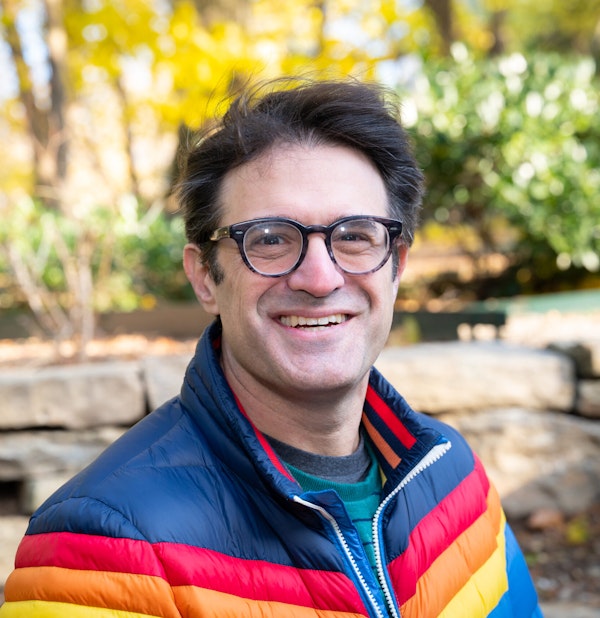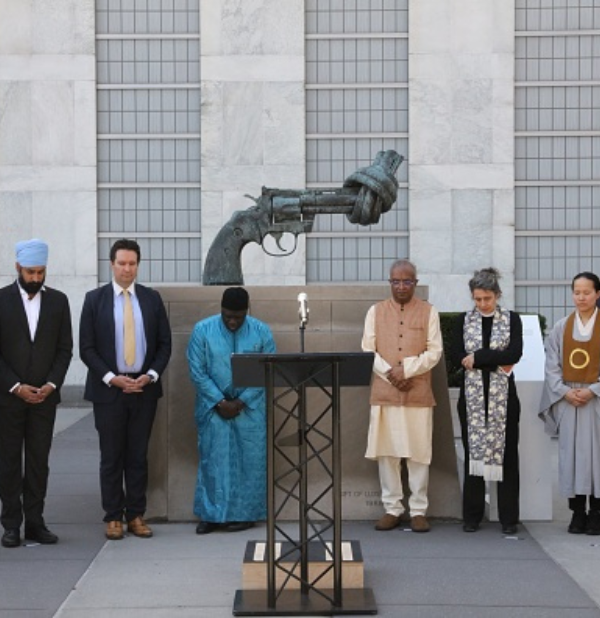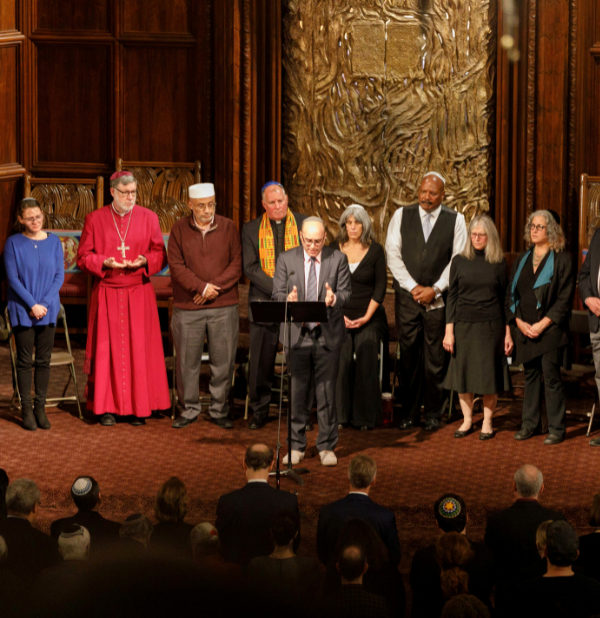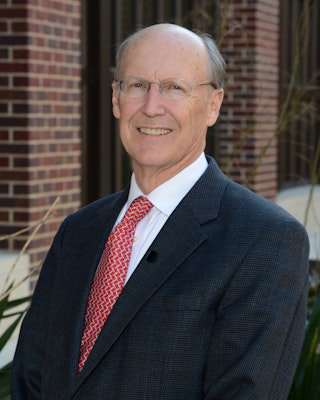Interview
Pluralism in the pew
Mark Oppenheimer on how people can disagree about faith – and most other things – but still get along
 Mark Oppenheimer in 2021. (Andi Schreiber)
Mark Oppenheimer in 2021. (Andi Schreiber)
M ark Oppenheimer has spent his career as a journalist, author, and professor studying the dynamics within and among religions. The Yale University graduate previously wrote the Beliefs column for The New York Times. He has also published five books and taught at universities around the country. He is now professor of practice at Washington University and editor of Arc: Religion, Politics, Et Cetera at the John C. Danforth Center on Religion and Politics. Oppenheimer spoke with Bush Institute Senior Editorial Advisor William McKenzie about the meaning, spirit, and practice of religious pluralism.
How do you define pluralism?
A respect for the coexistence of different groups – not as a fact or as a necessity, but as a positive good.
I was struck by the language in the online description of your journal, describing an arc as “the strongest structural shape joining two disparate points, [which] can be both a bridge and a gateway. An invitation to cross or to enter, and to connect.” Is that another way to talk about pluralism?
Sure. An arc is not only an architectural form but also a mode of welcome. An arc describes a home, a community, and a way of being.
What does pluralism mean within a religious context?
Pluralism means a renunciation of power and centralized authority as well as a positive, affirming welcome to differences. It means recognizing that in many societies in the past, people were presumed to be religiously similar, or religious identity was associated with citizenship or nationality – but now, in those societies, that doesn’t have to be the case.
 Interfaith prayer, UN headquarters, New York, NY, April 14, 2023. (Xie E/Xinhua / Getty Images)
Interfaith prayer, UN headquarters, New York, NY, April 14, 2023. (Xie E/Xinhua / Getty Images)
What conditions are necessary for respectful dialogues to take place among adherents of different faiths?
One condition is that no one feels afraid and that people can speak candidly and honestly with each other. They have to trust that what they say about the nature of God or the nature of reality or the possibility or impossibility of eternal truth won’t be held against them, won’t get them thrown in jail, or won’t render certain jobs or professions or houses off-limits to them. They have to believe that they have nothing to lose except for the respect of the person they are talking to.
Pluralism does not mean that people will find lots of common ground or agreement about religion. It doesn’t even mean that they will think well of one another’s religions. It is entirely possible to have a pluralistic society in which one person says to another person of a different religion that they think their religion is profoundly silly or completely false. That’s OK as long as people know [that] when they walk outside of the room in which they had that conversation, the laws apply to them equally and that they have equal access to civil society, the job market, housing, capital, and modes of communication. People have to recognize that even if one of them is profoundly in error – and logic tells us that religions often are incompatible – that doesn’t have anything to say about the status of that person’s citizenship or the security of their rights. Those are the conditions necessary for religious pluralism to take place.
Where do you see these kinds of conversations taking place?
Not too many places right now.
Pluralistic conversations or interfaith dialogues, as they are sometimes called, can be nice, but they don’t have to happen for a society to respect pluralism. There is no rule that an Orthodox Jew and an Eastern Orthodox Christian or a Maronite Christian and a Sikh or a Muslim and a Hindu must have bagels and coffee together all the time. It is within everyone’s rights to ignore anyone they want. That’s also part of being a citizen of a republic. We shouldn’t put too much pressure on the frequency or richness or depth of pluralistic conversations. What we have to be sure of is that when they happen, people feel unafraid and can speak truthfully as they see it.
Obviously, you want these conversations to be happening at universities, among friends, at book clubs, around poker tables, at the gym, or wherever. But you also have to recognize that people sometimes feel happier amongst their own. For example, a big part of going to synagogue for many Jews is the experience of being around fellow Jews. They don’t have to interrogate their faith on the Sabbath; they may just want to pray or read, study, meditate, or sit.
I don’t think you want to test the strength of civil society by asking how often and with what vigor are we seeing occasions for religious pluralism. If religious pluralism is successfully functioning, it might fade into the background. It might be an assumption of our daily lives that we live in a religiously pluralistic society and that people of different faiths or no faith at all live on the same street or in the same neighborhood and that they greet each other and respect that good fences make for good neighbors. Sometimes the strength of a pluralistic society is that those conversations don’t have to happen all the time.
 Religious and political leaders condemn antisemitism, Portland, OR, Oct.28, 2018. (Photo by John Rudoff/Sipa-USA / AP Images)
Religious and political leaders condemn antisemitism, Portland, OR, Oct.28, 2018. (Photo by John Rudoff/Sipa-USA / AP Images)
Do you think more people today are simply coexisting, pursuing different faiths and ignoring their differences?
I think that’s generally the rule. Even in our current contentious moments, most people are not looking to pick religious fights or to demean and debate others on the basis of religion. We see more religious condescension and degradation than we have in a long time because of the rise of the internet. We are a country of 330 million people and probably 10,000 of those people are responsible for heaping most of the religious abuse on other people. But those responsible parties have really large platforms and can command a lot of attention.
Possibly because Americans still have habits of niceness and don’t want to pick fights, they often overlook bigotry where they shouldn’t. We lost some of our capacity for disgust or distaste. We’ve lost some of our taboos. I wrote recently in the Wall Street Journal that we now have politicians, broadcasters, and other media figures saying things about Jews that would simply have been unacceptable even in the 1970s, when there was more latent antisemitism. The expectations of how public figures comported themselves were higher then.
In some ways, the old Republican Party was a bulwark against public antisemitism. A lot of the people who practiced private antisemitism in law firms, on Wall Streets, or in admission offices at elite schools were Republicans or conservatives who excused the genteel antisemitism that finally began to fall apart in the 1960s. But it began to move in concert with a rejection of public antisemitism. That was very important. In today’s world, we have moved past a lot of private antisemitism. You’re not going to see law firms rejecting applicants for first-year associates because of their Jewish last name. But we are more likely to vote for candidates who have said publicly antisemitic things. I’ m not sure that’s a good trade.
You have talked about it being natural for us to want to be around people who share our own beliefs. How can we do that and yet not slip into tribalism?
A lot of that depends upon what you mean by “tribalism.” I think it’s OK for people to define much of their identity by their ethnicity or religious belief. Not everyone has to think of their identity as a pluralistic, melting-pot Americanism. It’s OK for their identities to be primarily Jewish or Episcopalian or Latter-day Saints. It’s not OK for me to tell anyone they should not have a tribe. The problem, however, is that sometimes tribalism leads to bigotry and violence. That’s what you want to avoid. There is tribalism that is benign – the Amish are highly tribal, but they are not looking to deny people their rights or to push them off their land. Then there is tribalism that is violent. Avoiding the latter requires being on the lookout for violence, obeying the law, and not following fanatics.
In your reporting, do you see much pluralism being practiced in the pew, where people practice their faith together but don’t necessarily think alike about politics or other things?
It is clearly a reasonable expectation. And it describes my synagogue as well. I don’t know how everyone sitting next to me voted. I have a general sense that the majority of us voted in a particular way, but I know there are people who don’t.
We know from statistics that we are in an exceptionally polarized moment. But it doesn’t have to be that way. There are still communities where it is not. Religion is one of those human institutions that can encompass other kinds of pluralism. There’s no particular reason that a church or synagogue has to be politically homogenous. There’s no particular reason that the stands at a baseball game have to be politically homogenous. Politics doesn’t have to be totalizing. It is an unfortunate feature of the last decade or two that many people have come to not only be completely political actors in all aspects of their lives but to think that’s the best way to be.
I recently overheard a speech about how important it was that families could come together around the dinner table and set aside their political views. And I thought to myself that I know both conservatives who think that is unacceptable because they believe it is their job to convert their liberal friends and cousins and that it is unpatriotic to not do so, and that I know liberals who believe to break bread with people far to the right of them without raising political issues is somehow to abandon the cause.
It used to be that people would argue whether politics was downstream from culture or whether culture was downstream from politics. The reality is that politics in many ways has become culture. There is far less religious worship attendance today than 50 or 100 years ago, so people don’t necessarily base their identity on whether they are a Presbyterian or Jew. We know that participation in adult sports leagues is way down. So too with fraternal orders, like the Lions and Elks. As a result, people’s identity as Republicans or Democrats or conservatives or liberals has become much more important to them.
We are in a moment where so many of our nonpolitical institutions, which used to embrace people of all political persuasions, are weak. COVID-19 made them even weaker. That creates a challenge for our society: How do we get back to spending time in places where certain identity markers don’t represent the whole of who we are?
The Catalyst believes that ideas matter. We aim to stimulate debate on the most important issues of the day, featuring a range of arguments that are constructive, high-minded, and share our core values of freedom, opportunity, accountability, and compassion. To that end, we seek out ideas that may challenge us, and the authors’ views presented here are their own; The Catalyst does not endorse any particular policy, politician, or party.

